In June 2023 May/June, Atlas trader Susan Heller Evenson Democratic Republic of Congo (DRC) [with Chris Treter (Higher Grounds), Richard Hide (African Coffee Connect), Christophe Brinker (Ibero), and Congolese colleagues and friends] visiting longtime Atlas partners Muungano and Rebuild Women’s Hope, as well as meet and cup coffees from other cooperatives in South Kivu, DRC, many of whom have washing stations that sit along the western shores of Lake Kivu between Bukavu at the south end of the lake, and Goma at the north end of the lake.
Tumaini Coffee Cooperative
Our first visit was with Alina, the founder of Tumaini Coffee Cooperative (TCC), whose washing stations sit between Lake Kivu and Kihuzi-Biega National Park, home to the world’s only lowland Gorillas. The cooperative is starting the process to become Fairtrade certified and has 1,444 producers (953 of whom are women). They have also started a circular economy project whereby they rent a truck to pick up rubbish, sort the rubbish into organic and non-organic piles, and create compost from the organic trash. With this labor-intensive but effective method, from six tons of garbage, they can create 3.5 tons of compost!
KACCO
We then paid a somber visit to Kalehe, the area hit hardest from the area’s recent landslides in early May. Steven Kanene, the manager of the KACCO cooperative, is deeply involved with the community and has many members who were impacted by the landslides. Steven asked us to visit to see the impact on the community. As we walked along the spongy mud where thousands still lay beneath, sticks poking out of the mud here and there to indicate where bodies were still located, the community members told Steven about what they experienced, the family members they lost, and how they survived. On the Ground, a non-profit associated with Higher Grounds, was able to distribute some funding to some of the impacted families and survivors due to KACCO’s standing in the community, and ability to know the households and heads of household. KACCO itself had 15 drying tables destroyed at one of its three washing stations.
Muungano was founded in 2009 and currently has four main washing stations (Nyangoma, Buchiro, Kinyezire, and Nyabirehe), and 3 micro washing stations (Karango, Bishenge, and Chembumba).
We arrived in Kinyezire, where Muungano’s cupping lab and offices are located, and cupped a ‘tour of South Kivu’ collection of samples from nearly a dozen cooperatives in the region. Some were from well-established, larger cooperatives, such as Muungano, while others were from smaller cooperatives, such as Tuejnge Cooperative, which has 604 members and produces less than a container of coffee a year. It was encouraging to be able to cup a wide variety of cupping profiles.
One notable and widespread challenge was that, as many roasters and importers are long on coffee due to COVID-19 shipping delays, economic uncertainty, and other factors, cooperatives have received fewer contracts than in previous years. As a result, in early June, a time when washing stations are normally in full swing and even at max capacity, nearly all of the washing stations we visited sat empty, as all their contracted coffee had just been processed and was en route to a dry mill.
While some coffee-producing groups have the capital to buy cherry and process coffee without a contract, almost all cooperatives in South Kivu aren’t in the position due to a lack of capital and poor market access. This, on top of considerable logistical challenges—the “National Road No. 2”, which runs between Goma and Bukavu, has been washed out since November and is passable by land only by foot or on moto. Cooperatives along the lake must rely solely on boats to transport their coffee to the mills in Goma, adding considerable risk due to losing coffee overboard and/or theft.
One of Muungano’s most exciting recent developments is that, in January 2023 Muungano purchased a small dry mill in Goma from a USADF grant, and will not only be able to process this year’s coffee at the mill but also offer value-add milling services to other coffee cooperatives who lack their own dry mill. Not long before our visit, Muungano had received confirmation from Nuru, the largest off-grid mini-grid solar in sub-Saharan Africa, that they would be able to run their dry mill operations using solar energy, lowering their carbon footprint and the expense of using a gas-powered generator.
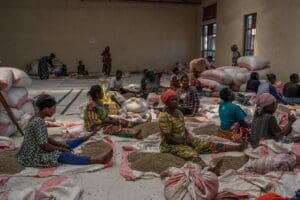
Women from the Muungano cooperative sort coffee, June 01, 2023 in Goma, North Kivu province, eastern Democratic Republic of Congo.
We visited two of Muungano’s washing stations, including its Bishenge micro washing station (which, along with Buchiro, processes naturals along with fully washed coffees), which sits at 1,559 masl, was constructed in 2019, has a female vice president. We also visited Buchiro washing station, and look forward to cupping coffee from Muungano’s newest micro washing station, Chemumba, which sits at nearly 2000 masl.
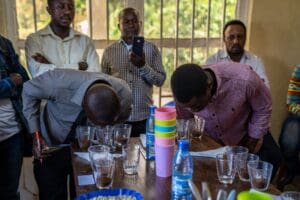
Ismael Bushashire (L) and Balthazar Baraka (R) taste coffee at the Muungano Coffee cooperative in Kiniezire, Kalehe territory, eastern DRC, May 30, 2023.
In addition to producing some of the region's—if not the country’s—finest coffees, Muungano is also strengthening its value chains by investing in some of its most important members: its women. In collaboration with the Rebuild Women’s Hope Cooperative and the French embassy, Muungano is currently doing a women’s literacy and economic skills project. They are also learning additional income-generating activities such as sewing and craft projects.
On the Ground (a non-profit associated with Higher Grounds Coffee) is also doing a GALS financial literacy project, specializing in adult literacy education and basic calculations so they can be more in charge of their earnings. They meet three times a week not only to learn how to become literate and numerate but also to spend time sharing their personal challenges.
In 2021, using Fairtrade funds, Muungano began construction on a much-needed, centrally located community and maternal health clinic. They need additional container sales to complete the construction, but even as the clinic is only partially finished, they can use one of the rooms to teach sewing. Once complete, the clinic will be able to treat wounds, provide basic medicines to community and cooperative Members, and have a maternity section. They even have land secured for an operating theatre, which will be constructed in Phase 2 after the first building is complete.
After our visit to Muungano and a few other cooperatives along Lake Kivu, we took a boat to north Idjwi Island, home to Rebuild Women’s Hope Cooperative. Idjwi Island, which sits in the middle of Lake Kivu, is the second-longest island in Africa after Madagascar, has no stoplights or paved roads, and its inhabitants rely primarily on motos and boats for transport around the island.
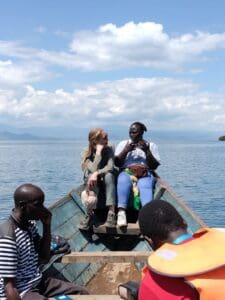
Susan (L) and Rebuild Women's Hope Founder and Engineer Marcelline Budza (R) on their way to Idjwi Island.
Rebuild Women’s Hope currently has 3,056 members (~1,500 of which are now certified Organic), is aiming for RFA certification in September 2023, and has four washing stations on Idjwi: Boza and Hala, which have Penagos EcoPulpers and wet fermentation; and Chasi (built in 2021) and Kolwe (built in 2022) that have more traditional pulpers and so pulp, dry ferment for 24 hours, in washing channels sort coffee into grade A (heaviest), B, and C (lightest) before 2nd wet soak of 24 hours.
Each washing station has a small team of logistics workers, a cashier, a Quality Control Officer, and a manager. When members deliver cherry, they can choose to either be paid immediately or to use RWH as a banking/savings account of sorts, and withdraw money only occasionally. Chasi and Boza, due to their more sunny locations, are also processing naturals.
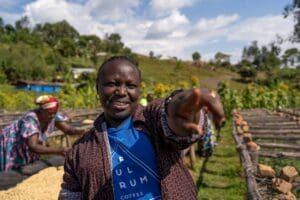
Marcelline visits the washing station located in the village of Tchasi, on the island of Idjwi, in eastern DRC, June 02, 2023.
Boza washing station is managed by Mary Chokoro, the only female washing station manager in South Kivu, to the best of everyone’s knowledge. Currently, 110 members are involved in an agronomy and agroforestry project through Oxfam Fairtrade to renew coffee trees, plant more shade trees and nitrogen fixers, and improve coffee quality. In August an additional 120 members will be added to the program.
In DRC, ONAPAC (Congo’s National Agricultural Office) sets the minimum price of cherry around once/month during the harvest based on the average NY ‘C’ level during that time.
While Idjwi is considered a calm region amid the often unstable eastern DRC region, farmers are also very susceptible to coffee smuggling into Rwanda. While taking a boat from one of RWH’s washing stations to another, someone pointed out a washing station that was built and constructed by a Rwandan group, where they would buy cherry, process it on Idjwi, and then illicitly bring parchment and green coffee across to Rwanda by boat, where it would be sold as Rwandan coffee. I’ve spent far too much thinking about the competitive disadvantage landlocked (or effectively landlocked, in DRC’s case) coffee-producing countries have over those with ports.
On a more positive note, Rebuild Women’s Hope constructed a much-needed medical clinic in 2019 on Idjwi between Hala and Boza WS focusing on women and children. More than 2,000 babies have been born in the clinic to date, and they hope to one day have an operating theatre. The clinic offers some free services to the community, and for the past year has been a part of a sexual reproductive health program that includes family planning services and education to reduce the risk of sexually transmitted diseases.
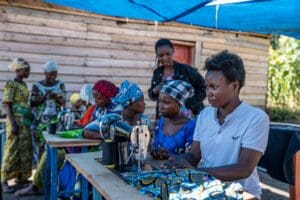
Furahini Matunda (R), 25, has been trained in cutting and sewing by Rebuild Women's Hope, with the aim of ensuring her financial independence. Photo taken at the Tchasi washing station on Idjwi Island, eastern DRC, June 02, 2023.
In Congo, there are many grades of Arabica coffee, with the two most commonly exported being Kivu 3 (“K3”), which is a fully-washed coffee, and Kivu 4 (“K4”), farmer-washed coffee. Due to Muungano and Rebuild Women’s Hope focus on high quality, Atlas was able to buy some higher grade K4 this year in addition to the K3 lots, so that we can offer additional offerings to roasters at different price points. Please reach out to your Atlas rep for specific cupping notes and samples of RWH and Muungano spot lots!